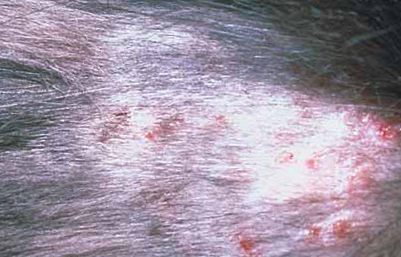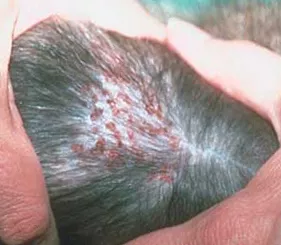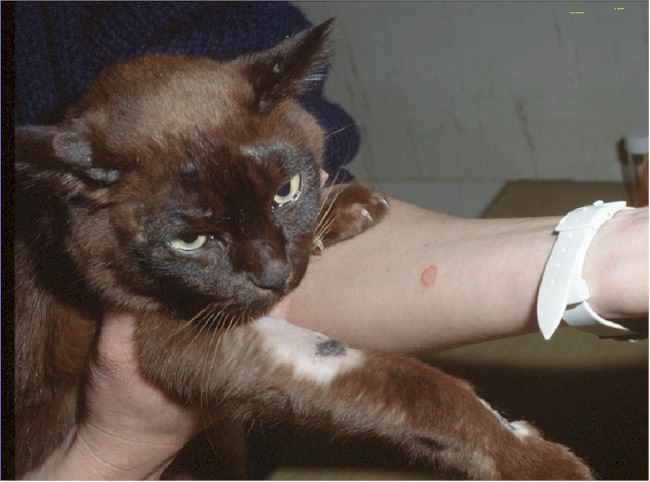A cat losing hair is a condition called alopecia, the second most common skin problem after itch. There are many possible reasons for hair loss in a cat, some of them serious and some of them not so serious. The first step is to note if the hair loss is self-induced (skin itch causes cat to be over grooming, pulling out or cutting the hair), or due to an underlying cause such as metabolic disease which contributes to excessive shedding.
The most common cause of hair loss in cats or bald patches is from a reaction to fleas or some type of allergy (environmental or food allergies). These conditions can be corrected with flea treatment or by removing an allergen. If an allergic reaction to fleas or some other substance is ruled out, then the veterinarian will move on to other causes that might interfere with hair growth such as metabolic or endocrine based diseases. Even hormonal imbalance that support hair growth can be a problem if the levels are too high or low.
Studies have shown that 76% of cats had medical causes for itch and hair loss. In 10% of cats causes were found to be behavioral. The rest were a combination of psychogenic alopecia (self inflicted injury due to an emotional or mental conflict), and medical causes of hair loss and itch.
 Miliary Dermatitis Patters of Cat Hair Loss on Stomach
Miliary Dermatitis Patters of Cat Hair Loss on StomachTypes of Hair Loss in Cats
Hair loss in cats is categorized by veterinary professionals in two ways:
- Acquired alopecia: Seen in cats that are born with normal hair, but later lose hair because of an underlying disease or illness.
- Congenital Alopecia: See in kittens or young cats and is caused by genetics or breed.(1)
Cat Alopecia Symptoms
Alopecia usually causes hair loss or a bald patch. The location of the hair loss will help with the diagnosis with the veterinarian noting if missing hair is in one location or spread over the body in random locations (diffuse) or symmetric (hair loss that is a mirror image on 2 sides of the body). Feline symmetrical hair loss mainly affects the ears, groin, abdomen and truck. In rare cases it will spread to the legs and head.
Many cats will have other symptoms, as well. Her skin may have skin conditions that are red or inflamed where the hair is falling out. She may be scratching or licking those areas resulting in the formation of lesions.. She could have a myriad of other symptoms, depending upon the cause of the hair loss.
Causes
There are four possible causes why cats lose hair.
- Problems with Follicular Growth: A hereditary or congenital disease can disrupt hair formation. Certain breeds have genetic diseases that are passed on such as the Canadian hairless cat.
- Changes in the Hair Shaft and Follicle: This is caused by some type of infection that leads to inflammation, resulting in the loss of cat hair. Causes include a bacteria (bacterial folliculitis) or fungus (dermophyte), or mange mites that invade the hair follicle (Demodex, commonly referred to as mange).
- Interruptions in the Hair Growth Cycle (rare): Certain metabolic or endocrine diseases can cause the hair to weaken and break or fall off. A biopsy can determine the cause of the cat hair loss along with clinical signs and a cat's medical history.
- Self-induced cat hair loss (most common): A cat will pull out or cut the hair if suffering from itch. The mot common causes of self-induced cat hair loss are a parasite such as fleas or allergies (hypersensitivities). These are described as:
- Facial pruritic dermatitis: term used to describe cat hair loss on the face
- Milliary dermatitis: a term that describes a skin reaction with many possible causes (it is not a diagnosis). The causes include flea-bites, allergens found in the environment such as pollen (atopy), food allergy, mosquito bites, mites, pemphigus, scabies or a mast cell tumor.
- Feline eosinophilic granuloma complex (EGC): result of immune system cells releasing inflammatory chemicals. Skin reaction is commonly due to the saliva left behind by flea, mosquito or mite bites. Related conditions are eosinophilic plaque and indolent ulcers.
- Psychogenic alopecia (when no other cause can be determine, excessive grooming due to anxiety).
Hair Loss from Excessive Licking
Cats are natural groomers, spending 30% to 50% of a day grooming themselves.(2) Cats over groom or lick when a part of the body is painful or it experiencing itch. The key is determining the underlying cause such as a neurological problem (old cats) or medical issues such as parasitic infections or fungal infections. Causes can also be fleas or allergic reactions.
If medical problems are eliminated stress could be the cause of excessive licking.
 Cat Hair Loss, Papules and Erosions Related to Miliary Dermatitis
Cat Hair Loss, Papules and Erosions Related to Miliary DermatitisHereditary Hair Loss
Cats with hereditary hair loss experience localized (one region) or symmetric hair loss (both sides of the body. The skin usually is not inflamed.
Cat Skin Allergies and Alopecia
Cat skin allergies are a common cause of a cat losing hair. Cats can be allergic to things in their environment, such as dust, pollen, and mold (called atopy). This causes red, inflamed spots on the skin, itching, and hair loss. Cat will lick the skin until there are bald spots. Scratching can make hair loss worse. Allergies are treated with steroids and antihistamines. Your vet can perform allergy tests to determine exactly what that is causing the allergic reaction. If necessary, she can be given allergy shots to desensitize her to that substance.
Food allergies are another possible cause of a cat losing hair. Symptoms look similar to those in cats with environmental allergies. Food allergies are less common than environmental allergies, though. The way to deal with food allergies is to place your cat on a special elimination diet which removes most food types from the diet to see if the reaction disappears. Single foods are gradually added back in. You veterinarian can provide instructions for how to get started.
Medications
A cat can also loose its' hair due when taking certain drugs (known as antimitotic drugs) or when the body is under stress from a severe disease. Other stresses on your cat's body such as fever, shock or surgery can also cause the hair to stop growing within 1 to 3 months of the problem. If you can identify any of these as the cause of the hair loss, then the problem should eventually heal itself, particularly if your cat is no longer taking a drug that caused the problem
Diagnosis
A veterinarian will start by taking a medical history and a physical examination in an attempt to develop an accurate diagnosis. . It can be somewhat difficult to diagnose cat alopecia because there are so many possible causes to rule out. Your vet will start with a thorough physical exam. He or she may do a number or special tests, such as blood tests, a urinalysis, examining your cat's skin under a special light, scraping her skin for some cells to examine under a microscope, and/or a skin biopsy.
Treatment
Alopecia and Cat Fleas
Flea dermatitis can cause cat alopecia. This is an allergy to the saliva from flea bites. It causes small, crusty red bumps, hair loss, and intense itching. Because of the severe itching, your cat may damage her skin and develop a secondary bacterial infection. Your cat must be treated for fleas, and her environment must be treated for fleas as well. If she has a bacterial infection, that will be treated with antibiotics.

The hair loss for flea-bite hypersensitivity is usually in the back half of your cat and areas where your cat cannot easily reach.
Treatment for cat losing hair due to this condition includes the use of flea removal/prevention products such as Frontline Plus for Cats, prescription medications such as glucocorticoids and antihistamines to help with itch. You might also want to supplement the diet with Omega 3, 6, 9 fatty acid Caps which are good for the skin.
Ringworm
 Cat Skin Fungus (Dermatophytosis or Ringworm)
Cat Skin Fungus (Dermatophytosis or Ringworm)A cat losing hair due to skin fungus is usually contracted when your cat comes in contact with fungus spores in the dirt or on another animal. The fungus attaches itself to the hair or skin. Signs of infection are seen between 2 to 4 weeks after exposure. Fungus prefers dead cells such as hair and nails and stops spreading when it comes in contact with healthy skin.
The most noticeable symptom of skin fungus is brittle areas or patches of hair which will look the the hair has been closely shaved in the area affected.
Symptoms in kittens include red areas that can be seen on your cat's paw, face and ear. These areas may look like they have a crust that is gray/white in color, covered in wet looking scabs or
The area may develop a thin, grayish white crust or a thick, moist scab. The area may or may not be itchy. Your kitten might spread the fungus all over the body when grooming.
Your veterinarian's diagnosis will be based on a skin test. Treatment options include allowing the ringworm to clear up with no treatment, or to speed up healing with anti-fungal shampoos and creams. Oral anti-fungal medications are needed if the ringworm has spread over the body.(7)
Thyroid Disease
Hair loss can be a symptom of a thyroid disorder called hyperthyroidism. A blood test can determine if your cat's thyroid is functioning properly. If not, your cat may require surgery to remove part of the thyroid gland.
Cat Psychogenic Dermatitis
As mentioned, psychogenic dermatitis a condition is which cats lick themselves excessively, causing hair loss. It may be caused by anxiety, stress, or boredom. It can also be triggered by a move to a new home, being isolated, or when a new cat is introduced to the home.
If possible, the source of stress must be relieved, but sometimes behavior modification medication is necessary.
Behavioral modification involves counterconditioning and desensitiazation.
Medications can include:(6)
- Phermones that reduce anxiety in cats
- Clomipramine (antidepressant)
- Fluoxetine (Prozac) which is also an antidepressant
- Amitriptyline which is both an antidepressant and antihistamine, which is helpful for itch.
Ask our Vet a Question about Cat Hair Loss
Have a question about cat hair loss? Our veterinarian will answer it for free. To help provide the best answer possible, please include your cat's medical history such as age, breed, medications, skin condition, location your cat is losing hair and any changes in behavior. Please include a picture if you can.
We will do our best to answer questions quickly (it depends on how many we receive each day). If you need an immediate response we suggest using this online cat veterinary answer service that is available 24 hours a day.
Other Reader Questions and Vet Answers
Click below to see contributions from other visitors to this page...
Itchy Red Bumps and No Hair After Being Neutered Not rated yet
Reader Question and Editor Suggestions on Cat Hair Loss after Neutering
My cat was neutered on 8/10/21. He had a descended testical. After his visit …
References
(1) https://www.petmd.com/cat/symptoms/loss-hair-cats
(2) Cornell Feline Health Center - Cats That Lick Too Much
(3) Causes of Hair Loss Holly Nash, DVM
(4) The Center for Food Security and Public Health Iowa State University College of Veterinary Medicine
(6) Veterinary Partner: Psychogenic Alopecia in Cats
(7) Merck Manual: Ringworm (Dermatophytosis) in Cats